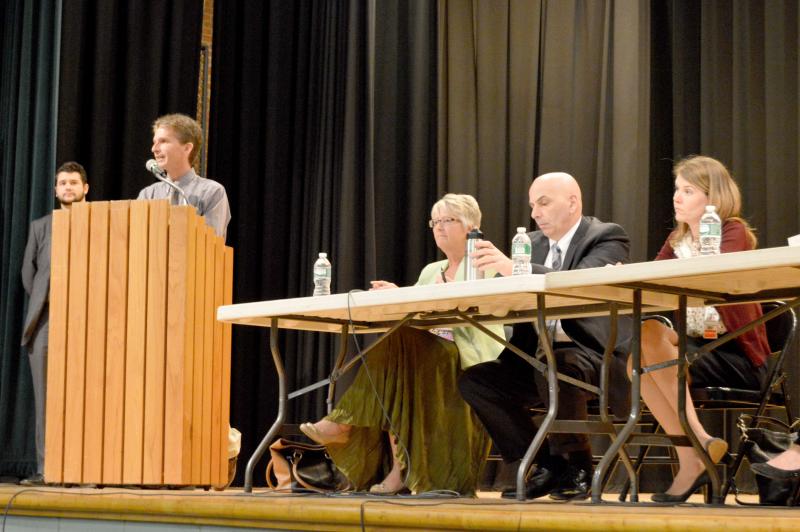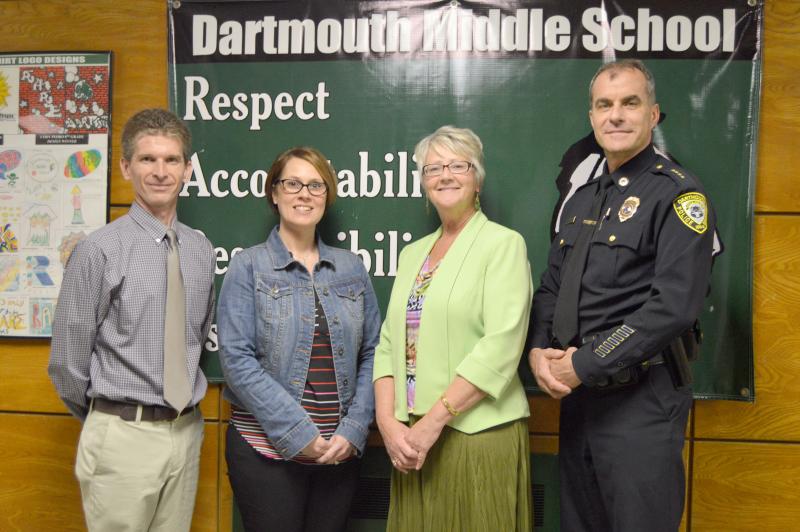New group combats opioid crisis through education
There is no silver bullet against the opioid crisis. But a newly formed group in Dartmouth has set out to explore options and serve as a unified front against the problem.
At a panel discussion on March 9, town officials, law enforcement and medical experts gathered to have a hard look at opioid use in the area. The group is called COPE (Community Offering Prevention & Education) and will continue to meet and share ideas.
The two-hour presentation at Dartmouth Middle School highlighted the complexities of the issue. As the eight panelists weighed in, common themes emerged.
One is acknowledging the problem. As many panelists noted, drugs are here in Dartmouth. According to the police department, there have been nine overdoses so far this year.
Dr. Jennifer Pope, chair of St. Luke Hospital’s Emergency Medicine Department, gave the audience a glimpse into the realities of drug use on the South Coast. She offered an exhaustive list of some of the patients she had seen at the St. Luke’s emergency room during an eight-hour shift the night before the panel.
One patient’s family wanted their son to have stronger painkillers following a minor injury. Another had suicidal thoughts brought on by withdrawals from heroin. A young woman was suffering from sepsis after a needle broke off into her hand. A 75-year-old man came in with shortness of breath, and his health history revealed that he had injected heroin three days prior.
“This is a disease of the very young, the very old and everyone in between,” said Pope. “One in six kids will have used prescription medication that was not theirs.”
Another common theme was stigma. Panelists said that making drugs a taboo subject or making those suffering from addiction feel like failures is not going to help the cause. Instead, drug addiction should be viewed as a disease that afflicts the brain.
“Part of removing stigma is engaging in conversations about addiction,” said Connie Rocha-Mimoso, director of community health services at Seven Hills Behavioral Health. “A lot of our youth don’t have that communication with family because we, as adults, are not open to that. Stigma stops individuals from seeking treatment, from getting educated, from talking about it at dinner tables.”
“Do not criticize,” she added.
Detective Kyle Costa, said that he, too, has been guilty in the past of stigmatizing addicts but has since realized the problem extends beyond “junkies.” He said that addiction does not discriminate, and the police receive drug-related calls from the hotels on Route 6 to Padanaram Village.
These first steps – the willingness to talk about drugs with loved ones and stamping out one’s own preconceptions about drug users – shape how people think about the opioid crisis. The panel also outlined several actions people can take.
Pope stressed the importance of locking up medications. April Cabrera, who represented the Bristol County District Attorney’s Office on the panel, said District Attorney Thomas Quinn is working to make sure every police station in the area has a drug collection receptacle, where citizens can dispose of unwanted, unused or expired medication. Dartmouth’s police station has a collection unit in its lobby.
Being trained to use and having access to the overdose reversing drug naloxone, known more commonly for its name brand Narcan, can help families ensure the safety of a loved one struggling with drug addiction. Narcan can be acquired through Seven Hills Behavioral Health in New Bedford.
Rocha-Mimoso reminded the audience about “Good Samaritan” laws in the state that protect individuals who call for help during an overdose emergency from being charged with drug possession.
“We have seen many individuals being left alone to die because people are afraid to call 911,” said Rocha-Mimoso. “Calling 911 should be the priority after administering Narcan.”
Costa said that Dartmouth’s police officers currently do not carry Narcan, nor is it stored in Dartmouth’s public schools. The town’s emergency responders do carry the drug, however. Both Costa and Superintendent Bonny Gifford said the conversation about Narcan had begun within both institutions.
Costa said COPE’s first panel discussion is just a start for the group, and this new collaborative effort will be ongoing.














